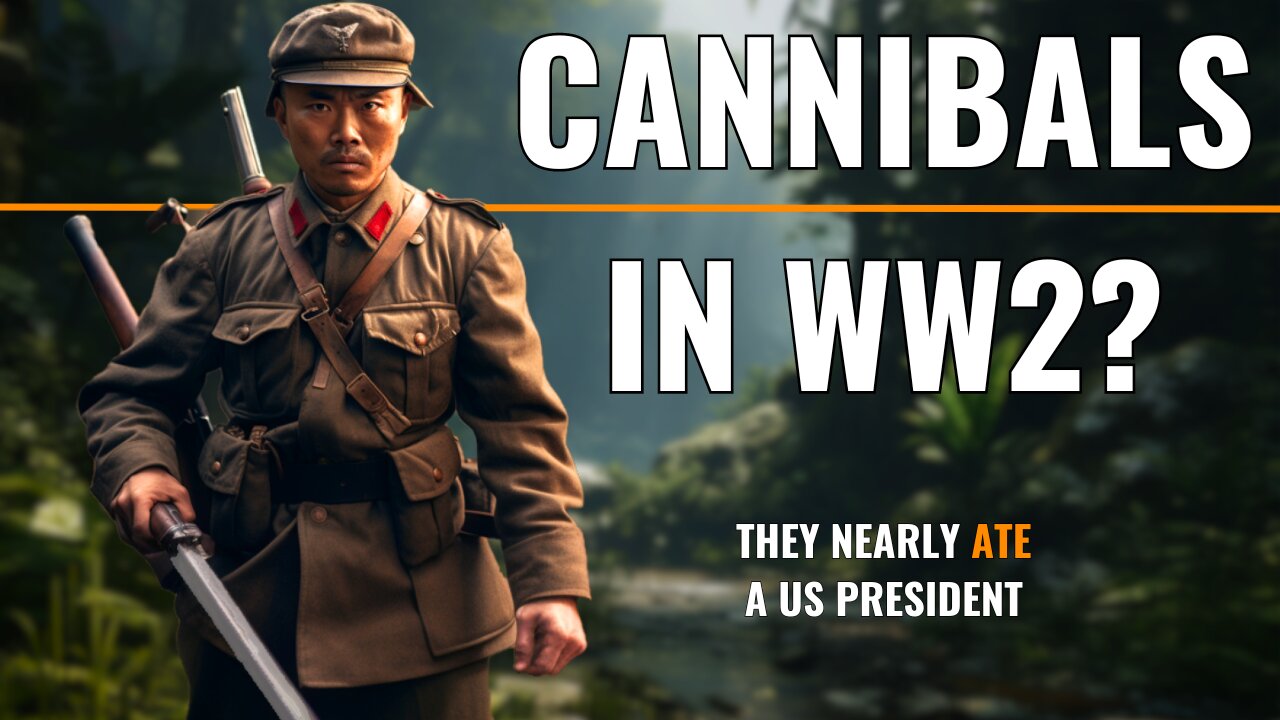Premium Only Content

Unknown Horrors of the Imperial Japanese Army During WW2
(An edited version for all audiences)
Ever heard of soldiers munching on other soldiers? Yeah, that happened.
________
To truly grasp the intensity of these horrors, we must first understand the ethos that drove many Japanese soldiers: Bushidō, a Japanese equivalent of a knight’s chivalric code.
It was as intense as it sounds. But it was also about a lot more than just swinging a katana and wearing armor.
Originating in the Edo period, which spanned from 1603 to 1868, Bushidō was a way of life, deeply ingrained in the samurai culture.
And while it might be tempting to draw parallels with European chivalry, let's not get too hasty. Sure, there were similarities, like a focus on honor and loyalty… to a degree.
But Bushidō had its own unique flavor, a blend of Confucianism, Shinto, and Zen Buddhism, giving it a depth and complexity that was distinctly Japanese, emphasizing values like sincerity, frugality, and loyalty above all else.
Loyalty especially, was paramount, even if not all samurai adhered to this principle… let alone all IJA members.
The pursuit of excellence in martial arts? That was expected of course. But it wasn't just about physical prowess. It was about the mind, strategy, discipline, and honor.
Honor until death. In fact, the concept of "seppuku" or ritual suicide was a testament to this. If a samurai felt they had lost their honor, they'd rather end their life than live in disgrace, ritualistically stabbing themselves in the stomach with the aim of disembowelment.
Ever heard of soldiers munching on other soldiers? Yeah, that happened.
________
To truly grasp the intensity of these horrors, we must first understand the ethos that drove many Japanese soldiers: Bushidō, a Japanese equivalent of a knight’s chivalric code.
It was as intense as it sounds. But it was also about a lot more than just swinging a katana and wearing armor.
Originating in the Edo period, which spanned from 1603 to 1868, Bushidō was a way of life, deeply ingrained in the samurai culture.
And while it might be tempting to draw parallels with European chivalry, let's not get too hasty. Sure, there were similarities, like a focus on honor and loyalty… to a degree.
But Bushidō had its own unique flavor, a blend of Confucianism, Shinto, and Zen Buddhism, giving it a depth and complexity that was distinctly Japanese, emphasizing values like sincerity, frugality, and loyalty above all else.
Loyalty especially, was paramount, even if not all samurai adhered to this principle… let alone all IJA members.
The pursuit of excellence in martial arts? That was expected of course. But it wasn't just about physical prowess. It was about the mind, strategy, discipline, and honor.
Honor until death. In fact, the concept of "seppuku" or ritual suicide was a testament to this. If a samurai felt they had lost their honor, they'd rather end their life than live in disgrace, ritualistically stabbing themselves in the stomach with the aim of disembowelment.
Ever heard of soldiers munching on other soldiers? Yeah, that happened.
________
To truly grasp the intensity of these horrors, we must first understand the ethos that drove many Japanese soldiers: Bushidō, a Japanese equivalent of a knight’s chivalric code.
It was as intense as it sounds. But it was also about a lot more than just swinging a katana and wearing armor.
Originating in the Edo period, which spanned from 1603 to 1868, Bushidō was a way of life, deeply ingrained in the samurai culture.
And while it might be tempting to draw parallels with European chivalry, let's not get too hasty. Sure, there were similarities, like a focus on honor and loyalty… to a degree.
But Bushidō had its own unique flavor, a blend of Confucianism, Shinto, and Zen Buddhism, giving it a depth and complexity that was distinctly Japanese, emphasizing values like sincerity, frugality, and loyalty above all else.
Loyalty especially, was paramount, even if not all samurai adhered to this principle… let alone all IJA members.
The pursuit of excellence in martial arts? That was expected of course. But it wasn't just about physical prowess. It was about the mind, strategy, discipline, and honor.
Honor until death. In fact, the concept of "seppuku" or ritual suicide was a testament to this. If a samurai felt they had lost their honor, they'd rather end their life than live in disgrace, ritualistically stabbing themselves in the stomach with the aim of disembowelment.
-
 LIVE
LIVE
Inverted World Live
2 hours agoWhat Now? | Ep. 152
8,174 watching -
 LIVE
LIVE
TimcastIRL
2 hours agoShots Fired At Timcast Studio, Man Arrested For Stalking Benny, Loomer, Matt Walsh | Timcast IRL
16,367 watching -
 LIVE
LIVE
Decoy
2 hours agoIt's happening
493 watching -
 26:14
26:14
Jasmin Laine
6 hours agoBREAKING: Liberals Caught Cutting SECRET Deal to Rewrite Speech Laws
94722 -
 17:33
17:33
Navy Media
5 hours ago $0.02 earnedChinese Fighter Jet Flies TOO CLOSE to US Navy Destroyer – BIG MISTAKE
291 -
 LIVE
LIVE
Jamie Kennedy
1 hour agoAre We All Being Played? Comedy, Politics, Sports & The Illusion of Control | Ep 234 HTBITY
51 watching -
 LIVE
LIVE
SpartakusLIVE
4 hours ago#1 Challenge MASTER brings YOU Monday Motivation
331 watching -
 LIVE
LIVE
Drew Hernandez
19 hours agoTIMCAST IRL STUDIO COMPOUND SHOT AT & TRUMP COMPLAINS ABOUT RINOS STALLING HIM
639 watching -
 LIVE
LIVE
svgames
3 hours ago🟢LIVE - ARC RAIDERS WITH @ZWOGS - BIRTHDAY / ONE YEAR ON RUMBLE
83 watching -
 1:36:51
1:36:51
Glenn Greenwald
5 hours agoTrump's New National Security Doctrine; What Marjorie Taylor Greene's Split with MAGA Reveals About the White House's Political Problems | SYSTEM UPDATE #555
92.2K24